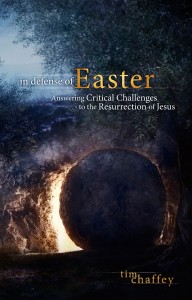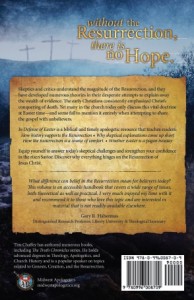
My latest book is a practical apologetic on the Resurrection of Jesus. See www.midwestapologetics.org/shop for more details.
Everything hinges on the Resurrection of Jesus. If He rose from the dead, as He predicted (Matthew 20:18–19; John 2:19–22), then He is exactly who He claimed to be and who the Bible proclaims Him to be: the Son of God, the Creator, and the Judge of all humanity. However, if Jesus did not rise from the dead, then He is a false teacher and could not have saved anyone from their sins because He would have needed to die for His own sins.
In 1 Corinthians 15, the Apostle Paul proclaimed that the gospel message he preached, and by which people are saved, is that Christ died for our sins according to the Scriptures, He was buried, and that He rose again according to the Scriptures. He went on to expound on the importance of the Resurrection throughout all 58 verses of this magnificent chapter.
The early church proclaimed the Resurrection at every opportunity. The book of Acts contains numerous sermons delivered by the apostles. Every single one of these messages focuses on the Resurrection of Jesus. Take some time to read through Acts and pay attention to the centrality of the Resurrection in the apostles’ preaching.
In Defense of Easter
I am thrilled to announce the publication of my book In Defense of Easter: Answering Critical Challenges to the Resurrection of Jesus. This unique book is a culmination of many years of research into this all-important subject and addresses many key topics related to the Resurrection. It is an apologetic work in that it highlights the numerous evidences for the Resurrection from the Bible, history, and archaeology. The second section of the book critiques all of the views raised by critics and skeptics over the centuries in their attempts to explain away this tremendous miracle. It is a highly practical book. The final section covers multiple relevant issues on the subject, such as why the Resurrection is a source of comfort and hope for believers. It is also designed to be a devotional and evangelistic book. Believers and unbelievers will be challenged to think through how they should respond to the risen Savior.
I have been speaking on the Resurrection of Jesus for about a decade, and it has always been my favorite talk to give. I’m excited that I’ve been invited to present it at the upcoming Answers in Genesis Mega Conference in Costa Mesa, CA, in July. I’ve been blessed with so many opportunities to share this glorious truth, but I’ve also noticed a disturbing trend among many believers. For whatever reason, this central doctrine is often overlooked and neglected by many Christians, including pastors and other leaders.
All of our hope is in the death-conquering Savior, so why does it seem like we only talk about it once a year at Easter time? How is it that so many modern Christians fail to mention this critical event in their preaching, and sadly, even when attempting to share the gospel? In Defense of Easter puts the Resurrection back where it belongs: along with Christ’s Crucifixion, right at the front and center of the Christian faith.
Dr. Gary Habermas, widely acknowledged as the leading scholar on the Resurrection today, wrote the following words about In Defense of Easter:
Challenges to Jesus’ Resurrection are frequently made on the popular level, and answers must be forthcoming. Tim Chaffey’s volume responds to many of these contemporary questions, as well as moving beyond arguments and evidences to the application of Resurrection truth. What difference can belief in the Resurrection mean for believers today? This volume is an accessible handbook that covers a wide range of issues, both theoretical as well as practical. I very much enjoyed my time with it and recommend it to those who love this topic and are interested in material that is not readily available elsewhere.
Order your copy of In Defense of Easter today from my online store, and get free shipping until Easter (April 20).


Hi there Tim,
There are two issues at stake here: The day of our Lord’s Crucifixion – I think most scholars will settle for the Thursday as do you and I.
Easter is another matter. I have not read any of your writings on the subject but quite a number of others. As you might have guest, my mother tongue is not English but “Afrikaans”, closely related to Dutch and influenced by many other languages. I can to a certain standard, also read and understand German. Your statement that the word Easter is of German origin astonishes me since the word existed well before German was even a world language.
The miss translation of the word in Acts 12:4 in the AV, is what it is all about – especially since the AV got it right in Mat.26:2,17-19; Mark 14:12 and 1 Cor.5:7.
The many commentaries stating its origin and festivities long before Jesus’earthly life, are too many to list here. It is in its very being PAGAN connected to the queen of heaven who goes by many names(Astarte, Isjtar,etc) one also being “Ashtoreth the abomination of the Zidonians”(2 Kings 23:13), see also Jer. 44:19.(Sun worship). Lastly, more on sun worship(I see you also mention the “Rising sun” with your German words for East). See Ezekiel 8: 14-16(AV).
So, Easter is not just a word, it is abomination before our LORD brought to the true Saints be the Roman Catholic system. the Druids made it popular in England being masters of Satan worship and witch craft at the time of the Romans there – and it is thriving in our day in Masonry and other occult societies.
Yours in His Name and Blessings!
Deon Barnard
Hi Deon,
Thank you for your civil tone on this matter. Many of the people who share your view that I’ve heard from are not as friendly. My comments are also offered in an irenic tone.
Let me make two quick points, since I don’t have much time in the next few days to respond. First, this issue really has nothing to do with the KJV’s use of the word Easter in Acts 12:4. Obviously, the Greek there is referring to the Passover. The issue is whether or not Christians who celebrate the Resurrection of Jesus Christ on the day we call “Easter” are doing something pagan. While I cannot speak for all Christians, I can tell you that celebrating the Resurrection of Jesus is not pagan no matter what day one does it—even if they do it with a sunrise service (after all, the women went to the tomb at dawn, which is why many churches have these services). Neither is there any solid evidence that “Easter” comes from the names of the various pagan goddesses, as I mentioned previously. And even if it did come from that, why would it be wrong to celebrate the Resurrection on a day called “Easter”? We celebrate various holidays on days of the week named after pagan gods—even if you are only celebrating the holy days spelled out in Leviticus, you are still celebrating them on days of the week named after pagan gods, but it doesn’t mean that you are worshiping a pagan deity.
Second, it doesn’t really matter how many books and commentaries claim that the origin and festivities were pagan practices long before Christ’s earthly life. What matters is if you can find original sources that say this. What you need to show are documents from those time periods that make this claim, rather than Alexander Hislop’s sloppy research that says they did these things. There are so many errors in his work that it is astonishing that his claims are continually promoted. I have asked people who hold your view time and again to cite original sources, and for the most part, all I ever get are Hislop’s claims repackaged from various websites.
Here’s what I would like to know. How did pagans celebrate the Resurrection of Jesus before Jesus ever walked the earth? You mentioned that you haven’t read any of my other work. Please read the article at the link I gave in my previous response or check out my chapter in my book. Since this is such a big issue for some people, I do plan to write in more detail about it in the coming weeks.
Sincerely,
Tim
Tim, I am thrilled by your emphasis on the Resurrection of our Lord – as you rightly proclaim – that is the pinnacle of our faith and Christianity.
What worries me is the use of the word “Easter” and I am positively sure that you have researched this word and its pagan origin thoroughly. A further point of contention of cause is the day on which our Lord died. From His own testimony – comparing his three days and three nights in the grave with the time that Jona spent in the bowel of the Whale; Crucifixion could not possibly have taken place on the Friday.
Hi Deon,
Thanks for the kind words about my emphasis on the Resurrection.
You should not be troubled by my use of the word “Easter” since it simply means “Resurrection.” Despite some popular teachings online (that seem to all go back to Hislop’s Two Babylons), the word Easter comes from the German word Oster (Easter), from Ost (East)—the direction of the rising sun. There is no solid evidence that Easter comes from Eostre or Ishtar or Astarte or Asherah or any other supposed pagan godesses (neither are these goddesses the same entity). I would highly recommend an article by my colleague on this subject, available here: http://www.answersingenesis.org/articles/2011/04/19/name-easter-pagan
You can also check out Ralph Woodrow’s book where he repudiates his earlier beliefs about the pagan origins of these things. He had originally held the views advanced by Hislop and even published a book about them. But eventually he came to see that there was very little to no basis for many of Hislop’s claims, and he wrote to correct his earlier errors. I have a whole chapter in my book on whether Easter is a pagan holiday.
As for the three days and three nights argument, here is something I wrote recently on a facebook discussion about this issue where someone posted a chart arguing for a Wednesday Crucifixion based on the three days and three nights comment:
I hope this helps.